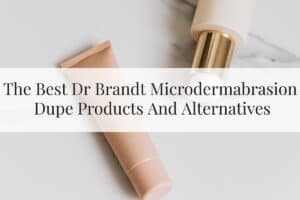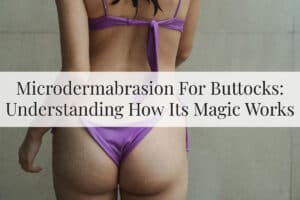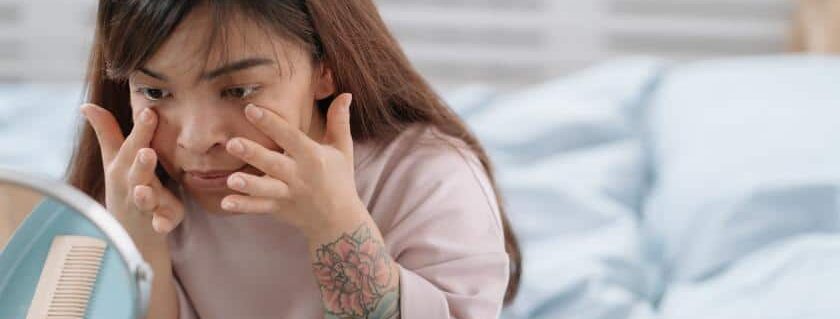
Rubbing Alcohol Acne Treatment: Is It Effective And Safe?

Rubbing alcohol is a common way of soothing the skin and cleaning off bacteria. By virtue of its cleansing properties, it is considered effective in clearing acne. It is mostly used as a base agent in combination with other healing ingredients such as tea tree oil and aspirin.
This alcohol is often used for skin cleansing. Its antiseptic properties are, after all, used to cleanse wounds. Therefore, it seems reasonable to assume that it can also help clear acne. However, it may cause skin irritation and painful skin peeling, so rubbing alcohol should not be used for extended periods in an effort to treat acne.
What is Rubbing Alcohol?
Chemistry refers to rubbing alcohol as isopropyl alcohol. A combination of water and propane is used to produce it. In the United States, sulfuric acid is added to the reaction vessel to accelerate the process.
Because it dissolves DNA, it is used in labs to extract DNA from tissues for genetic analysis. Rubbing this alcohol on your skin removes fat deposits present on the surface of your skin. Some of the most popular brands include:
Isocol antiseptic: This is an effective cleanser known to kill germs on the skin and prevent the development of acne spots. It can also dry out oily skin.
Isopropyl wintergreen rubbing alcohol: This multipurpose solution acts as a disinfectant, cleansing surfaces and skin, while its wintergreen scent provides a refreshing touch. Additionally, it’s utilized for its soothing effect on minor aches and pains, making it a versatile addition to your household.
Alcohol as an Astringent
Before you buy rubbing alcohol, it is essential that you first understand the logic behind it. An astringent is a skin care product used to remove excess sebum from the skin. Isopropyl is cheap and readily available at any drugstore. Most rubbing alcohol products contain at least 70 percent isopropyl, while only 30 percent is oil and water.
These products are known to fight harmful microbes, including bacteria. The effects make them ideal for disinfecting surfaces. Isopropyl can only kill acne bacteria when the concentration is 45 percent. Any percentage less than this can only irritate the skin, leaving it to repair itself by making more sebum. Once alcohol comes into contact with your skin, it destroys all types of bacteria. The question is, “Does it work?”
Well, the antimicrobial and antibacterial attributes of rubbing alcohol could be used to treat acne, especially inflammatory acne [1], which is triggered by the P. acnes bacterium. You could create a homemade astringent by mixing it with clove or tea tree oil. These microorganisms result in pustules, nodules, papules, and cysts. For blackheads and whiteheads, alcohol may not have similar effects because these are non-inflammatory.
It may feel great to use isopropyl on your skin. But it is worth noting that too much of it strips the skin and does not tone it. Exposing your skin to the frequent application of isopropyl strips it of sebum and robs it of moisture. While it is not scientifically proven to prevent or treat acne breakouts, you might want to stick to facial washes to clean and tone your skin.
Is Rubbing Alcohol Good for Acne?
Potential Benefits
While rubbing alcohol may temporarily reduce the appearance of acne, its long-term effects can be counterproductive.
Some individuals with oily skin might experience a short-lived improvement, but this is often followed by a rebound effect. Moreover, rubbing alcohol does little to address the root causes of acne.
Rubbing alcohol is a potential acne-fighting solution. However, so far, there is no clear evidence regarding its effectiveness or safety.
Before this has been clinically proven to be effective, it might be safe to start with tried-and-true ones such as benzoyl peroxide and salicylic acid, which are especially preferred for their capacity to also eliminate blackheads and whiteheads.
Potential Risks
Using rubbing alcohol on your face carries several risks. Its harsh nature can disrupt the skin’s barrier function, causing redness, peeling, and a burning sensation. Prolonged use can lead to chronic dryness and even worsen existing skin conditions.
Rubbing Alcohol Acne Treatment
Before applying rubbing alcohol to your face, it’s important to select an isopropyl solution containing no more than 70 percent ethanol. Many readily available non-prescription options contain alcohol levels ranging from 70 to 90 percent, depending on the manufacturer.
However, it’s advisable to avoid using such high concentrations on your skin to prevent potential damage. Due to alcohol’s inherent drying properties, you could opt to dilute it with a gentle carrier oil like tea tree oil.
Here is a simple procedure you can follow:
Begin by cleansing your face using a soft cloth, then gently pat it dry.
Utilize a cotton swab to apply the alcohol to any affected areas, such as rashes and scars.
Allow the alcohol to naturally evaporate from your skin’s surface.
Subsequently, apply a layer of sunscreen or moisturizer to safeguard and nourish your skin.
Isopropyl may be safe for your skin but can cause dryness, redness, itchiness, flaking, pain, and peeling. Rubbing the alcohol on sensitive skin could make your acne worse. Once your skin dries out, it responds by triggering the sebaceous glands to produce more sebum. Dried-out skin can also produce more dead skin cells, which may then clog the pores, leading to blackheads and whiteheads.
Alternatives to Isopropyl Alcohol
There are more soothing products, such as microdermabrasion for scars, that could be employed to get rid of acne, most of which contain acne-fighting ingredients like salicylic acid.
Some of them are expensive and don’t have great effects like those offered by witch hazel. Witch hazel is an excellent alternative to isopropyl alcohol. It prevents dehydration and reduces the irritation of inflamed skin.
Since microdermabrasion is gaining popularity in the market these days for its gentle and effective treatment, it can now be done both clinically and at the ease of your own home.
Does microdermabrasion help with blackheads? Not only is that a definite yes with the right product (if you’re doing it at home), but it is also known to reduce the appearance of acne and other skin conditions such as fine lines, wrinkles, stretch marks, and hyperpigmentation.
If you continue to experience breakout episodes despite the use of OTC creams or home remedies, see a dermatologist. They should evaluate your skin and give you proper medication for your condition. Should you experience any side effects from using rubbing alcohol, see your dermatologist to prevent further damage to your skin.
Frequently Asked Questions
Can rubbing alcohol get rid of acne overnight?
Rubbing alcohol may provide temporary relief, but it’s unlikely to eliminate acne overnight. Long-term solutions require a holistic approach.
Is it safe to apply rubbing alcohol on sensitive skin?
Rubbing alcohol can be harsh and irritating, especially for sensitive skin. It’s better to opt for gentler skincare alternatives.
Are natural remedies like tea tree oil effective against acne?
Tea tree oil has shown promise for combating acne due to its antimicrobial properties. However, results vary, and it may not work for everyone.
Should I pop my pimples to get rid of acne?
Popping pimples can lead to scarring and worsen inflammation. It’s best to avoid this practice and focus on proper skincare.
How long does it take to see results from a new skincare routine?
Results from a new skincare routine can take several weeks to several months, as skin cell turnover and healing processes require time.
Conclusion
On your journey to fighting acne breakouts and acne scars, it is important that you make informed choices to experience the best results. Although rubbing alcohol as an acne treatment can provide a quick, temporary fix, it is not a sustainable or safe solution in the long term.
Make sure to prioritize a comprehensive skincare routine and look for proven alternatives that can control and treat acne. The safest and best option you have is to consult an expert or a dermatologist who can provide you with solutions based on your unique needs.
Also, check out the other comparison review I did below for more options on facial care procedures:
Popular Articles:



The Best Dr Brandt Microdermabrasion Dupe Products And Alternatives

Microdermabrasion For Sensitive Skin: How To Prepare For A Gentle Treatment

Microdermabrasion For Pores: 3 Incredible Ways It Helps Your Skin

Microdermabrasion For Buttocks: Understanding How Its Magic Works






